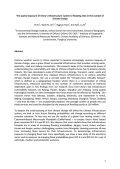
Extreme weather events in China, expected to become increasingly common because of climate change, pose a grave threat to essential infrastructure that provides running water, electricity, road and railway connections. This research looks at the fundamental issues of understanding the vulnerability and risks to Chinese infrastructures due to adverse climate impacts. The authors have developed a suite of infrastructure (energy, transport, water, waste and ICT) models to understand how exposed China's infrastructure is to various potential climate change impacts. A concept called the “infrastructure criticality hotspot” is used which is defined as a geographical location where there is a concentration of critical infrastructure, measured according to the number of customers directly or indirectly dependent upon it. Key findings from this research show that China’s top infrastructure vulnerability hotspots are Beijing, Tianjin, Jiangsu, Shanghai and Zhejiang. Using spatial hydrological models, the authors then investigate how these areas may be affected by flooding.
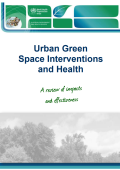
Interventions on green space in urban settings can help address public health issues related to obesity, cardiovascular effects, mental health and well-being. However, knowledge on their effectiveness in relation to health, well-being and equity is incomplete. To explore the effectiveness of urban green space interventions to enhance healthy urban environments, the WHO Regional Office for Europe reviewed research findings, local case studies and Environmental Impact Assessment/Health Impact Assessment experiences, and assessed their impacts on environment, health, well-being and equity.
The report "Urban Green Space Interventions and Health: A review of impacts and effectiveness" provides the three working papers prepared for a meeting, and presents the discussion and conclusions on what intervention components have been found to be effective in maximizing the environmental, health and equity benefits derived from urban green spaces.
To access the related policy brief "Urban green spaces: a brief for action", click here.
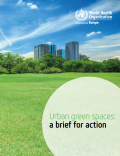
Urbanization results in an increasing proportion of the population living in cities. Green spaces and other nature-based solutions offer innovative approaches to increase the quality of urban settings, enhance local resilience and promote sustainable lifestyles, improving both the health and the well-being of urban residents. Parks, playgrounds or vegetation in public and private places are a central component of these approaches.
The brief "Urban green spaces: a brief for action" aims to support urban policy-makers and practitioners by translating the key findings of a review of research evidence and practical case studies on urban green space interventions into implications for practice. It presents lessons learned and highlights aspects to consider when designing urban green spaces to maximize social and health benefits.
To access the related technical report "Urban Green Space Interventions and Health: A review of impacts and effectiveness", click here.
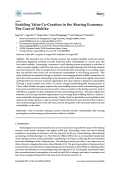
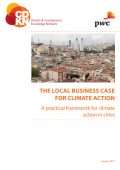
Cities are responsible for up to 70% of global greenhouse gas emissions, therefore climate change needs to be resolved in cities. There is an important window of opportunity to help cities, especially in rapidly urbanising developing countries, to better manage their future growth and development.
This working paper identifies five levers of effective climate action in cities that climate change practitioners should be aware of, and where appropriate, build into their project approach to support more effective climate action in cities. The five levers are:
- Power and leadership
- Communications and engagement
- Capacity building
- Financing implementation
- Demonstration effect
